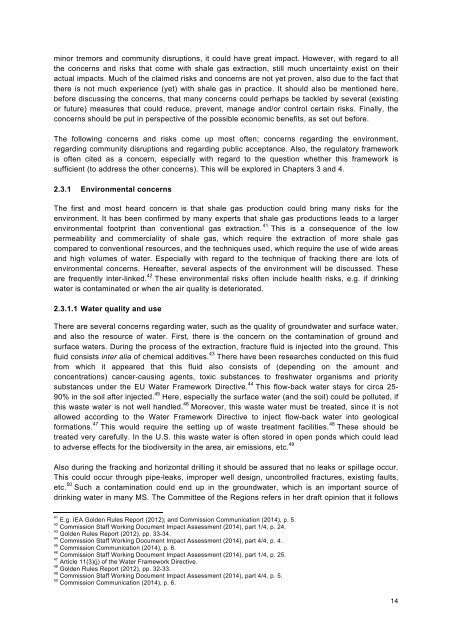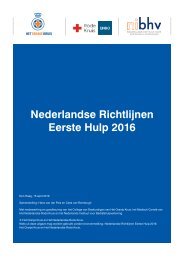Thesis-Anne-Vos-Masters-SBR-and-EU-Law-3
Thesis-Anne-Vos-Masters-SBR-and-EU-Law-3
Thesis-Anne-Vos-Masters-SBR-and-EU-Law-3
Create successful ePaper yourself
Turn your PDF publications into a flip-book with our unique Google optimized e-Paper software.
minor tremors <strong>and</strong> community disruptions, it could have great impact. However, with regard to all<br />
the concerns <strong>and</strong> risks that come with shale gas extraction, still much uncertainty exist on their<br />
actual impacts. Much of the claimed risks <strong>and</strong> concerns are not yet proven, also due to the fact that<br />
there is not much experience (yet) with shale gas in practice. It should also be mentioned here,<br />
before discussing the concerns, that many concerns could perhaps be tackled by several (existing<br />
or future) measures that could reduce, prevent, manage <strong>and</strong>/or control certain risks. Finally, the<br />
concerns should be put in perspective of the possible economic benefits, as set out before.<br />
The following concerns <strong>and</strong> risks come up most often; concerns regarding the environment,<br />
regarding community disruptions <strong>and</strong> regarding public acceptance. Also, the regulatory framework<br />
is often cited as a concern, especially with regard to the question whether this framework is<br />
sufficient (to address the other concerns). This will be explored in Chapters 3 <strong>and</strong> 4.<br />
2.3.1 Environmental concerns<br />
The first <strong>and</strong> most heard concern is that shale gas production could bring many risks for the<br />
environment. It has been confirmed by many experts that shale gas productions leads to a larger<br />
environmental footprint than conventional gas extraction. 41 This is a consequence of the low<br />
permeability <strong>and</strong> commerciality of shale gas, which require the extraction of more shale gas<br />
compared to conventional resources, <strong>and</strong> the techniques used, which require the use of wide areas<br />
<strong>and</strong> high volumes of water. Especially with regard to the technique of fracking there are lots of<br />
environmental concerns. Hereafter, several aspects of the environment will be discussed. These<br />
are frequently inter-linked. 42 These environmental risks often include health risks, e.g. if drinking<br />
water is contaminated or when the air quality is deteriorated.<br />
2.3.1.1 Water quality <strong>and</strong> use<br />
There are several concerns regarding water, such as the quality of groundwater <strong>and</strong> surface water,<br />
<strong>and</strong> also the resource of water. First, there is the concern on the contamination of ground <strong>and</strong><br />
surface waters. During the process of the extraction, fracture fluid is injected into the ground. This<br />
fluid consists inter alia of chemical additives. 43 There have been researches conducted on this fluid<br />
from which it appeared that this fluid also consists of (depending on the amount <strong>and</strong><br />
concentrations) cancer-causing agents, toxic substances to freshwater organisms <strong>and</strong> priority<br />
substances under the <strong>EU</strong> Water Framework Directive. 44 This flow-back water stays for circa 25-<br />
90% in the soil after injected. 45 Here, especially the surface water (<strong>and</strong> the soil) could be polluted, if<br />
this waste water is not well h<strong>and</strong>led. 46 Moreover, this waste water must be treated, since it is not<br />
allowed according to the Water Framework Directive to inject flow-back water into geological<br />
formations. 47 This would require the setting up of waste treatment facilities. 48 These should be<br />
treated very carefully. In the U.S. this waste water is often stored in open ponds which could lead<br />
to adverse effects for the biodiversity in the area, air emissions, etc. 49<br />
Also during the fracking <strong>and</strong> horizontal drilling it should be assured that no leaks or spillage occur.<br />
This could occur through pipe-leaks, improper well design, uncontrolled fractures, existing faults,<br />
etc. 50 Such a contamination could end up in the groundwater, which is an important source of<br />
drinking water in many MS. The Committee of the Regions refers in her draft opinion that it follows<br />
41<br />
E.g. IEA Golden Rules Report (2012); <strong>and</strong> Commission Communication (2014), p. 5.<br />
42<br />
Commission Staff Working Document Impact Assessment (2014), part 1/4, p. 24.<br />
43<br />
Golden Rules Report (2012), pp. 33-34.<br />
44<br />
Commission Staff Working Document Impact Assessment (2014), part 4/4, p. 4.<br />
45<br />
Commission Communication (2014), p. 6.<br />
46<br />
Commission Staff Working Document Impact Assessment (2014), part 1/4, p. 25.<br />
47<br />
Article 11(3)(j) of the Water Framework Directive.<br />
48<br />
Golden Rules Report (2012), pp. 32-33.<br />
49<br />
Commission Staff Working Document Impact Assessment (2014), part 4/4, p. 5.<br />
50<br />
Commission Communication (2014), p. 6.<br />
14



